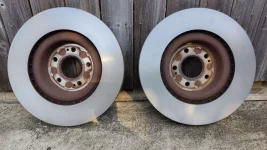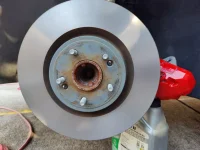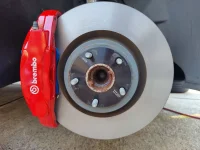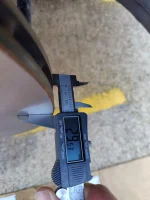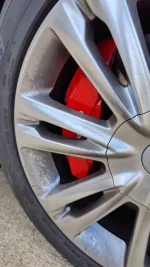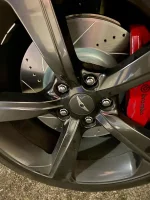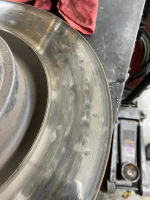@ejguillot @Husky I should explain a bit more what happened with my brake pad change.
What I typically do when I change brake pads is a 2-stage (or 3-stage) process, depending on brake pad type.
Stage 1: Seating the new pads to rotor. Right after installing brake pads - even if the rotors are brand new or freshly resurfaced - and especially if old rotors are kept as is, I drive the car as I usually do on public roads. That is to say, very gently and with as little brake application as possible. When brake
is applied, I do so very gradually and with as light pressure on the pedal as necessary. Purpose here is to wear the contact surfaces of the new brake pads to mate as perfectly flat with the rotor surface as possible... without introducing excess heat, which might glaze the pads material surface. This process could take anywhere between 100-300 milee. Meanwhile, I keep a close eye on the rotor surface for any wear bands, hot spots, and other abnormality.
Stage 2: Bedding the brake pads. Once the pads are seated well to the rotors, Heat can be introduced to "bed in" the pads. Some brake pad mfrs have very specific instructions on how this should be done for each of their pads, depending on friction material compound. If no instructions are given, this is typically done by applying steady moderate pressure on brake pedal to decel from, say, 80mph to 30mph. Smoothly accel back up to pressure and repeat. Purpose of this stage is heat the pads to above a specific temp, in order to release the volatile compounds in the pad material so as to make them less prone to brake fade. Some pad material absolutely must have this done, often in various additional stages. Others, like ceramics, tend not to be as critical.
See here for an example:
How To Bed-In Your EBC Brakes For Street Or Track Use - EBC Brakes
What happened with mine was the during the initial portion of Stage 1, the pads ran smoothly with light pedal pressure. However, towards the 1/2 half of Stage 1, where I begin to apply more force on the brake pedal to seat the pads more fully, that's when I start to experience the vibration. This is very different from the "grittiness" that I felt with previous OEM. That was almost like the the pads were wearing against coarse sandpaper... because that is essentially what the pad material deposit does to the rotor surface. Although this occurs whenever the brake pedal pressure is applied, it is actually more noticeable at lower speeds. At higher speeds, the rotor is spinning so fast, the grittiness isn't felt as distinctly.
This latest vibration was actually a real pulsating vibration - very different in feel - and to me, far more alarming. This most likely was caused by the brake pads not pressing against the rotor along parallel planes. That oblique angle engagement causes the the pressure applied across the pad surface to be uneven and thus causing the lighter pressure end to bound up and down, which is the vibration I heard/felt. This biggest difference is that this pulsation is speed dependent. At some speeds, the rotor speed hits the resonant frequency of the brake pad "bounce", thereby exacerbating the phenomenon. At lower speeds, the rotor tend not to spin fast enough to excite the vibration.
I didn't let this go on for very long, because it could potentially wear the pad surface too unevenly. So I took the rotors off to be resurfaced. I just redid the first 1/2 of my Stage 1 seating of the pads today, and no vibration felt so far, at any speed, up to about 80mph. I'll continue with heavier brake pedal pressure tomorrow, and we'll see how it goes. From what I can feel, I think it's looking good.
If I'm able to complete Stage 1, then that's when I will start Stage 2 the bedding in part.
Like I said, I fully own up to trying to be cheap and see if I can get away with not spending the money for pad resurfacing. At $100/4-rotors, it isn't exactly insignificant. It's a gamble... and I lost this round.





